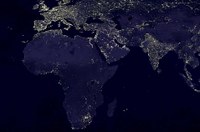 The subcontinent, home to one billion people, has a total power supply equal to that of Spain where less than 50 million people live. Access to electricity in Africa, moreover, is concentrated in cities. More than 70% of Africa's urban residents have electricity, compared to just 13% of the continent's rural population.
The subcontinent, home to one billion people, has a total power supply equal to that of Spain where less than 50 million people live. Access to electricity in Africa, moreover, is concentrated in cities. More than 70% of Africa's urban residents have electricity, compared to just 13% of the continent's rural population.
These statistics, based on a report (PDF, 888 Kb) published by the African Science Academy Development Initiative (ASADI), Turning Science On: Improving Access to Energy in sub-Saharan Africa, frame the discussion in an article published in the TWAS Newsletter, examining the state of electricity supplies on the continent.
Access to electricity is fundamental to the most critical issues facing sub-Saharan Africa today. For example, it matters for food security because it powers the appliances that reduce spoilage and waste. It matters for education because it provides light for children to read by. It matters for gender equality because women generally carry out the tedious and backbreaking work of gathering firewood. And it matters for public health because it improves the quality of care and reduces the number of Africans who suffer the adverse effects of indoor air pollution.
While the prospects for access to electricity remain dim, a growing number of innovative applications of renewable energy and off-grid schemes have been implemented to light-up poor and remote parts of the continent. For instance, in Khayelitsha, a poor township outside of Cape Town, the government of South Africa has equipped some 2,000 homes with solar water heaters and energy-efficient light bulbs. In Lake Kivu in Rwanda, the World Bank has provided funds for a project designed to generate electricity produced by generators fueled by methane extracted from the lake bed.
While these small-scale projects are welcome, their impact remains modest. Biomass – charcoal- wood- and waste-burning – will continue to provide most of Africa's energy. Moreover, the use of contemporary sources of energy – most notably, coal and natural gas – varies from country to country. In South Africa, for example, coal dominates the energy mix. In Nigeria, oil and natural gas are the primary formal energy sources. In Ethiopia, it is hydropower.
Africa's equatorial sun and brisk winds make solar and wind power attractive candidates for electrifying remote African villages. There are also potential geological sources of energy that await exploitation. For example, the government of Kenya is investing in geothermal power in the Rift Valley, which could produce as much as 9,000 megawatts of power – equal to nine nuclear power plants.
And, then there is nuclear power itself. Several African countries, including Nigeria, Senegal, Uganda, Ghana and Niger, have expressed a desire to acquire nuclear technology. So far, however, only South Africa operates a nuclear power plant.
The bottom line is this: While sub-Saharan Africa is awash with energy-generation potential, the subcontinent's politicians should not expect to wean the population off traditional biomass energy sources anytime soon.
The fact is that there will be no magical, single-source solutions to meeting the region's growing energy needs. As the ASADI report concludes, Africa's political leaders will need to draw on the broad range of energy sources and expertise both within and beyond Africa to create a brighter future for the continent and its people.
Find the full TWAS Newsletter article below.

